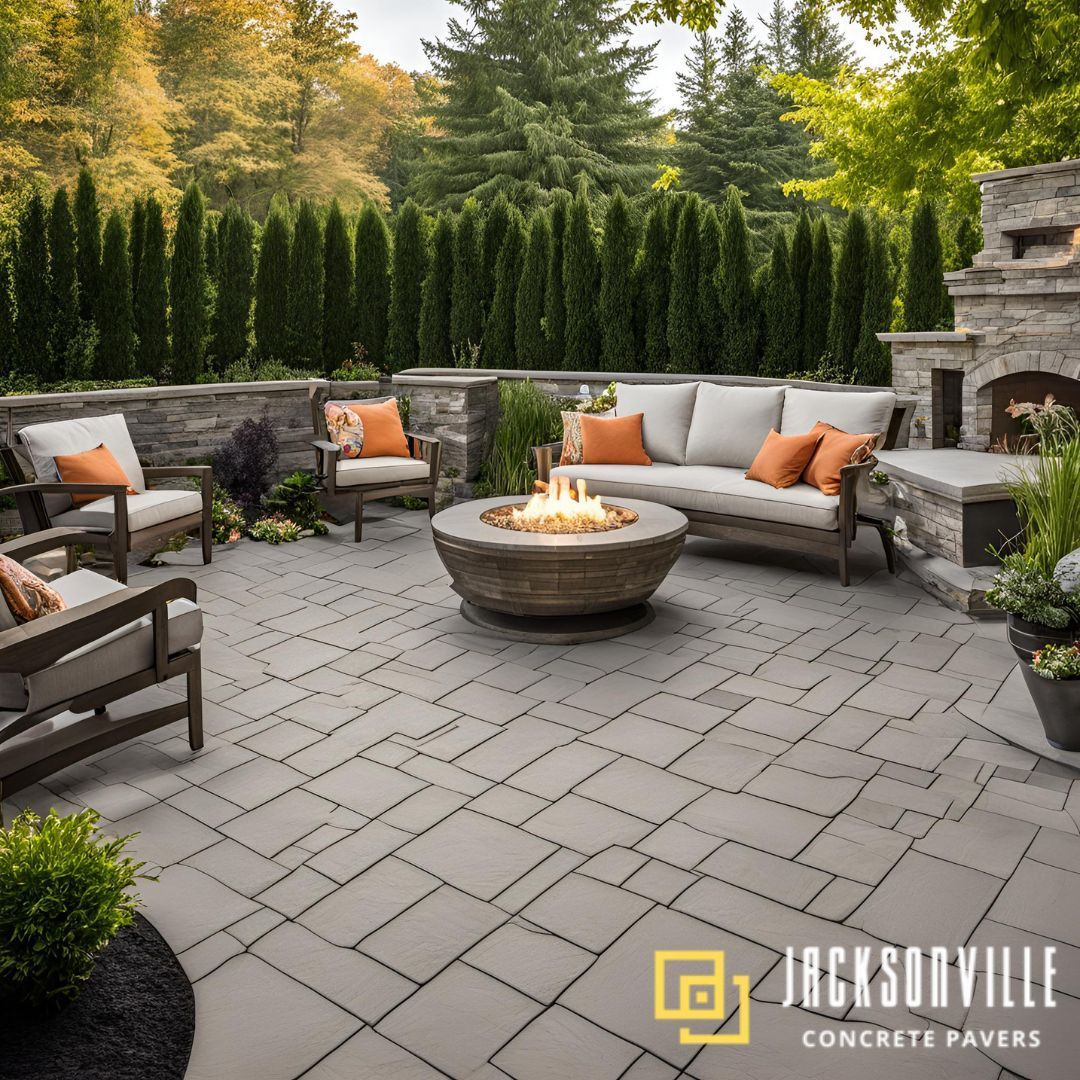Paver Patio vs. Deck: Which Adds More Value?
When it comes to enhancing your outdoor living space and adding value to your home, the choice often boils down to two popular options: paver patios and decks. Each offers unique benefits and considerations. This comprehensive guide will highlight the specific differences between decks and paver patios to help you make an informed decision that best suits your needs and maximizes your investment.
Understanding Paver Patios
What is a Paver Patio?
A paver patio is a versatile and durable outdoor flooring solution made from various materials such as concrete pavers, bricks, or natural stone pavers. These materials are laid out in a pattern directly on a leveled ground surface. Paver patios are highly customizable, allowing homeowners to create intricate designs that enhance the aesthetic appeal of their outdoor space.
Common Types of Paver Materials:
- Concrete Pavers: Concrete patio pavers are durable and cost-effective, available in a variety of shapes, colors, and sizes.
- Brick Pavers: Traditional and sturdy, providing a classic look.
- Natural Stones: Natural stone pavers are luxurious and long-lasting but more expensive.
Pros of Paver Patios
- Cost-Effective: Basic paver patios are generally cheaper to install than decks, ranging from $10 to $17 per square foot, which is more affordable than most decking materials.
- Low Maintenance: One of the main advantages of paver patios is their low maintenance requirements. They need occasional sweeping and washing to keep them looking new. Concrete pavers are particularly resilient and can withstand various weather conditions.
- Durability: Paver patios are built to last. With proper installation and minimal maintenance, they can endure for decades without significant wear and tear. Unlike wood decks, paver patios are not susceptible to rotting or warping.
- No Permit Required: According to the Florida building code, a patio not more than 30 inches above the adjacent grade does not require a permit, which simplifies the installation process and reduces costs and waiting times.
Cons of Paver Patios
- Not Suitable for Uneven Terrain: Every patio design requires a flat surface for installation. If your yard has a natural slope or is uneven, you will need to invest in ground leveling, which can increase the overall cost.
- Prone to Staining and Cracking: While durable, one key difference between pavers from decks is that they can stain over time and may crack if the ground shifts or is not properly prepared during installation. In addition, proper maintenance such as regular inspections and occasional resealing can mitigate these issues.
Understanding Decks
What is a Deck?
A deck is an elevated structure typically attached to your home, made from materials such as wood or composite. Decks provide an elevated outdoor living space and are popular for their versatility and aesthetic appeal. They can be customized with various features like railings, built-in seating, and planters.
Materials Used:
- Wooden Decks: Commonly used materials include pressure-treated pine, cedar, and redwood.
- Composite: Made from a mixture of wood fibers and plastic, offering low maintenance and high durability.
- Aluminum: Durable and low-maintenance but expensive.
Pros of Decks
- Elevated Views: Decks offer a raised platform that can provide better views of your surroundings and create a more dynamic outdoor space. This elevation can also enhance privacy.
- Higher ROI: Decks typically offer a higher return on investment compared to patios. A well-built deck can recover about 76% of its cost in added home value, making it a worthwhile investment.
- Flexible Design: Decks can be customized in various shapes and sizes to fit your space and design preferences. They can also incorporate features like built-in seating, planters, and railings, adding functionality and style .
Cons of Decks
- Higher Initial Cost: Building a deck is generally more expensive than installing a patio. Costs can range from $25 to $43 per square foot depending on the materials used and the complexity of the design.
- Maintenance Requirements: Wood decks require regular maintenance to protect against the elements. This includes staining, sealing, and occasional repairs to prevent decay and pest damage.
- Permit Needed: Most decks require building permits, which can add time and additional costs to your project. Compliance with local building codes is necessary to ensure safety and durability.
Cost Comparison
Patio Pavers
Patio installations generally range from $10 to $17 per square foot, making it a cost-effective option compared to decks. For example, a 16x12-foot concrete patio might cost around $2,000 to $3,000, including professional installation).
Decks
Building a deck is typically more expensive due to the materials and labor involved. The cost can range from $25 to $43 per square foot. For a 16x20-foot deck, the total cost can vary from $6,720 to $22,720 depending on the materials used and the complexity of the design .
Resale Value
Decks
Decks generally offer a higher return on investment (ROI). A well-constructed deck can increase your home's value by approximately 76% of its cost. This high ROI is due to the popularity of decks among homebuyers and their ability to enhance the overall appeal of a property.
Paver Patios
Patio pavers, while offering a higher average cost per square foot, can still provide excellent returns. Some estimates suggest a 100% return on investment for well-designed patios, especially when they are integrated with attractive landscaping and other outdoor features.
Maintenance and Longevity
Decks
Wood decks, particularly, require regular maintenance to protect against weather-related damage. This includes power washing, staining, and sealing at least every two years to extend their lifespan. Composite decks, while more expensive initially, require less maintenance but still need occasional cleaning.
Paver Patios
Paver patios are generally easier to maintain, even for commercial projects. Regular cleaning with a hose or pressure washer is usually sufficient to keep them looking their best. They are also less prone to damage from weather and can last significantly longer than natural wood decks if properly installed and maintained. In addition, paver repairs are rarely needed as you can easily repair yours without needing to touch the whole space.
Conclusion
By weighing the differences between decks and patios and considering your long-term plans, you can make a decision that not only enhances your outdoor enjoyment but also adds significant value to your home.
Choosing between deck vs patio pavers depends on your specific needs, budget, and the characteristics of your outdoor space. If you seek a cost-effective, low-maintenance option, a paver patio might be the best choice - even though it can have higher upfront costs. Ultimately, the decision is up to your personal preference. Both have their pros, and both have their cons. So pick one that is the best option for you and your home.
For residents in Jacksonville looking to enhance their outdoor living space, consider consulting with Jacksonville Concrete Pavers to explore the best options tailored to your home and lifestyle. We offer free consultations and free removal of your old existing outdoor area - making your outdoor project as hassle-free as possible.
Frequently Asked Questions (FAQs)
1. What is the difference between a deck and a patio?
The main difference is that a deck is an elevated structure usually made of wood or composite materials, while a patio is a ground-level surface made of pavers, concrete, or stone.
2. Is it cheaper to build a deck or patio?
Yes. Building a patio is usually cheaper than a deck due to lower material and installation costs.
3. Which is easier to maintain, a deck or a patio?
Patios are generally easier to maintain, compared to natural wood decks which need regular staining and sealing. However, routine maintenance must still be observed.
4. Do I need a permit to build a deck or patio?
Decks usually require permits, especially if they are attached to the house or elevated. Patios often do not require permits.
5. Can I install a patio on uneven ground or is a flat ground required?
Yes. However, installing a patio on uneven ground requires additional ground preparation, which can increase project costs. Decks can be built on slopes more easily.
6. Which is more durable, a deck or a patio?
Patios. Paver patios are generally more durable and can last longer than wood decks, especially if constructed with concrete pavers or stone.




